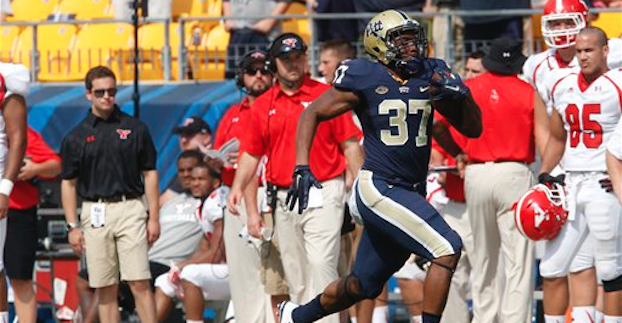There were six ACC running backs who eclipsed the 1,000-yard benchmark during the 2015 season. One of those players was Pitt ball-carrier Qadree Ollison, who finished fourth in the league that year in rushing: 1,121 yards on 212 carries. Ollison scored 11 touchdowns on the ground and produced in high-leverage situations for Pitt’s offense.
This, of course, was done in the absence of James Conner, the team’s star running back who missed the vast majority of the season with a knee injury. Ollison was thrust into the lead back role, and he delivered — claiming ACC Offensive Rookie of the Year honors.
Conner, heroically, returned to the gridiron in 2016 after defeating cancer in the offseason, which is an amazing achievement on its own. However, Conner did more than just lace up his cleats; he carried the ball 208 times and finished third in the ACC in rushing touchdowns (16).
With Conner receiving the lion’s share of Pitt’s backfield touches, Ollison saw his role greatly reduced under first-year offensive coordinator Matt Canada — a recent hire of the LSU coaching staff. This also followed what his position coach, Andre Powell, referred to as an “awful” spring for Ollison.
In fact, no running back in the conference saw a greater decline in their output than Ollison — and it wasn’t even close. The ACC’s top 10 runners (in terms of yards) from 2015 all returned in 2016. Several backs saw their numbers decline; Ollison’s role diverted in the most extreme fashion.
| Player | 2015 Carries | 2015 Yards | 2016 Carries | 2016 Yards | Carries difference | Yards difference |
|---|---|---|---|---|---|---|
| Dalvin Cook | 229 | 1691 | 268 | 1620 | +39 | -71 |
| Wayne Gallman | 283 | 1527 | 196 | 1002 | -87 | -525 |
| Elijah Hood | 219 | 1463 | 145 | 858 | -74 | -605 |
| Qadree Ollison | 212 | 1121 | 27 | 103 | -185 | -1018 |
| Travon McMillian | 200 | 1042 | 136 | 637 | -64 | -405 |
| Joe Yearby | 205 | 1002 | 99 | 592 | -106 | -410 |
| Matt Dayes | 134 | 865 | 249 | 1166 | +115 | +301 |
| Smoke Mizzell | 164 | 664 | 187 | 940 | +23 | +276 |
| Marcus Marshall | 86 | 654 | 96 | 624 | +10 | -30 |
| Brandon Radcliff | 139 | 634 | 132 | 877 | -7 | +243 |
Notes:
-
This chart only includes statistics from the top 10 running backs. Quarterbacks aren’t included.
-
Chart includes numbers through games on Dec. 26. Some players, like Gallman, Cook and Yearby, still have game action ahead of them.
As a sophomore, Ollison carried the ball 185 fewer times; his rushing yards decreased by 1,018. That’s a nearly 91 percent decrease in terms of yardage. He ran the ball nine times in a Week 2 upset over Penn State. That proved to be the most he touched the ball all season long.
Ollison recorded just nine carries over the final two full months of the season. After catching 14 passes (22 targets) in 2015, he was targeted just four times this season in the passing game. He caught one pass for eight yards.
No other ACC back is even in the same zip code in terms of reduction. Elijah Hood, who will miss North Carolina’s bowl game against Stanford, ran for 605 fewer yards in 2016. Miami’s Joe Yearby, who intends to forgo his final season in Coral Gables and jump to the NFL, was the next-closest in terms of in decline of carries (-106). Mark Walton broke out in 2016 and proved to be a vulture in terms of stealing carries from Yearby.
Conner plans to enter the 2017 NFL Draft, which means Ollison should be in the running for more carries next season. The Panthers could also have a more egalitarian distribution of touches in 2017.
Freshman Chawntez Moss and sophomore Darrin Hall combined for 374 yards on the ground (73 carries) this season; they will be a part of Pat Narduzzi’s rushing attack going forward, too. And of course, wide receiver Quadree Henderson, a first-team All-ACC specialist, proved to be one of the league’s most explosive runners: five touchdowns and 12 highlight yards per opportunity, according to Football Study Hall.
The last three seasons, Pitt has featured a back offensively. Narduzzi, who has been at the school since 2015, plans to run the same offense in 2017, despite losing Canada to the Bayou Bengals. If Ollison is deemed the lead back following, he could ride the wave and quickly vault to the top of the ACC’s leading rushers once again.

















